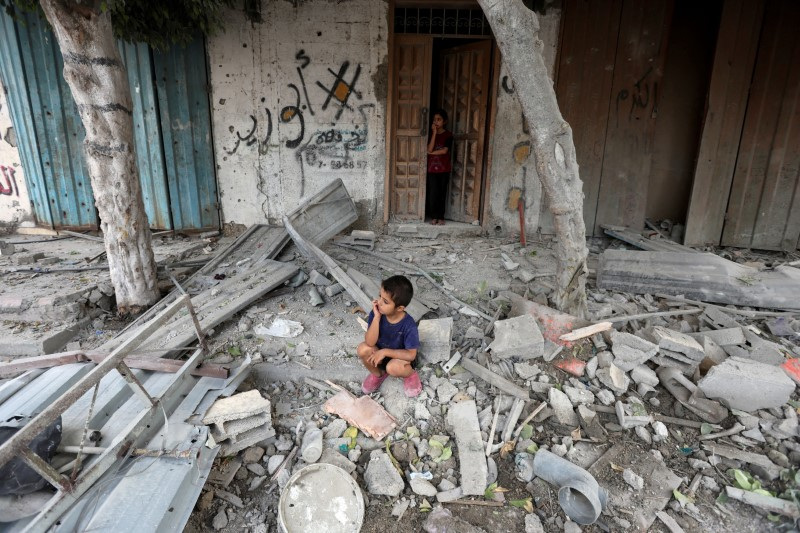Hamas to stay out of Gaza truce talks but may meet mediators afterwards

By Nidal al-Mughrabi
CAIRO (Reuters) -Hamas said on Wednesday it would not take part in a new round of Gaza ceasefire talks slated for Thursday in Qatar, but an official briefed on the talks said mediators expected to consult with the Palestinian group afterwards.
The U.S. has said it expects indirect talks to go ahead as planned in Qatar’s capital Doha on Thursday, and that a ceasefire agreement was still possible, while warning that progress was needed urgently to avert a wider war.
Axios reported that U.S. Secretary of State Antony Blinken has postponed a trip to the Middle East that had been expected to begin on Tuesday. White House press secretary Karine Jean-Pierre told reporters that CIA Director Bill Burns and U.S. Middle East envoy Brett McGurk will represent Washington at the talks on Thursday in Qatar.
Three senior Iranian officials have said that only a ceasefire deal in Gaza would hold Iran back from direct retaliation against Israel for the assassination of Hamas leader Ismail Haniyeh on its soil last month.
“Israel will send the negotiations team on the agreed upon date, that’s tomorrow Aug. 15th, in order to finalise the details of the implementation of the framework agreement,” government spokesperson David Mencer said in a briefing.
The delegation includes Israel’s spy chief David Barnea, head of the domestic security service Ronen Bar and the military’s hostages chief Nitzan Alon, a defence official said.
Hamas has voiced scepticism about the talks, accusing Israel of stalling. Israeli Prime Minister Benjamin Netanyahu says that Hamas leader Yahya Sinwar has been the main obstacle to a deal.
“Going to new negotiations allows the occupation to impose new conditions and employ the maze of negotiation to conduct more massacres,” Senior Hamas official Sami Abu Zuhri told Reuters.
Hamas’ absence from the talks does not eliminate chances of progress since its chief negotiator Khalil al-Hayya is based in Doha and the group has open channels with Egypt and Qatar.
“Hamas is committed to the proposal presented to it on July 2, which is based on the U.N. Security Council resolution and the Biden speech and the movement is prepared to immediately begin discussion over a mechanism to implement it,” said Abu Zuhri.
A source familiar with the matter said Hamas wants the mediators to come back with a “serious response” from Israel. If that happens, the group says, it will meet with mediators after the Thursday session. An official briefed on the talks process said mediators expected to consult with Hamas.
In a statement Hamas issued late on Wednesday jointly with some smaller factions, it reaffirmed the outstanding demands the factions wanted a ceasefire agreement to achieve.
The group said negotiations “should examine mechanisms to implement what was agreed upon in the framework deal submitted by mediators that would achieve a comprehensive ceasefire, a complete withdrawal of Israeli forces, breaking the siege, opening crossings and reconstruction of Gaza as well as reaching a serious hostages/prisoners deal.”
The statement rejected any U.S. or Israeli intervention in shaping the day after the war in Gaza.
LEBANON
Amos Hochstein, a senior adviser to U.S. President Joe Biden, was in Lebanon to deter a separate escalation between Iran-backed Hezbollah and Israel, after a senior Hezbollah commander was killed in Beirut’s southern suburbs last month.
Hochstein met parliament speaker Nabih Berri, who heads the armed Amal movement, allied to Hezbollah, and will meet Lebanese caretaker Prime Minister Najib Mikati.
“There’s no more valid excuses from any party for any further delay,” the U.S. envoy told a press conference.
In Gaza, residents of the southern city of Khan Younis said Israeli forces blew up homes in the east and intensified tank shelling on eastern areas of the city centre.
Israel said it was responding to Hamas rocket fire and had struck launching pads and militants. Armed wings of Hamas and Islamic Jihad said they had attacked Israeli forces.
Hamas also said its fighters were engaged in fierce clashes with Israeli forces in the Israeli-occupied West Bank, where Israel said it had killed a number of militants.
A ceasefire deal would aim to ensure the release of Israeli hostages held there in return for Palestinians jailed in Israel, but the two sides remain divided by sequencing and other issues.
Netanyahu has insisted that Israel retain control of a border strip between Gaza and Egypt to stop weapons smuggling, though Israel’s military chief of staff Herzi Halevi has said it could monitor the area remotely if necessary.
Divisions also remain over allowing people inside Gaza to travel freely between parts of the territory after a ceasefire deal.
A Hamas-led attack on Israeli communities around the Gaza Strip on Oct. 7 killed some 1,200 people, mostly civilians, with more than 250 taken hostage to Gaza, according to Israeli tallies.

In response, Israeli forces have razed much of Gaza, displaced most of the population and killed around 40,000 people, most of them civilians, according to the Palestinian health ministry.
Israel has lost more than 300 soldiers and says around a third of the Palestinian fatalities in Gaza have been fighters.





